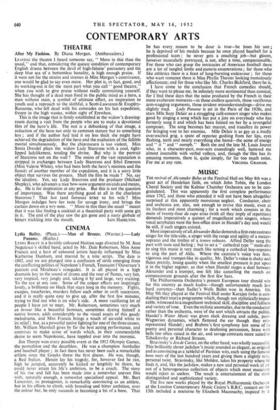CONTEMPORARY ARTS
THEATRE
After My Fashion. By Diana Morgan. (Ambassadors.) LEAVING the theatre I heard someone say, "More in this than the usual," and that, considering the queasy condition of contemporary English drama between the devil of high-falutin' poetastery and the deep blue sea of a bottomless banality, is high enough praise. If it were not for the strains and stresses in Miss Morgan's contrivance, one would be glad to say even more. Her plot is, in fact, good, and its working-out is for the most part what you call "good theatre," when you wish to give praise without really committing yourself. She has thought of a dead man fixed in the public mind as a hero, a man without stain, a symbol of ultimate effort, an inspiration to youth and a reproach to the slothful, a Scott-Lawrence-St Exupery- Ransome, who fell dead with his comrades on his last expedition, frozen in the high wastes, within sight of Erewhon.
This is the image that is firmly established in the widow's drawing- room during a visit from the people who are to make a devotional film of the hero's life. The rest is a debunking of that image, a reduction of the hero not only to common stature but to something less ; and if the author had laid it on less thick she might have achieved the degradation of the hero and the exaltation of the fallible mortal simultaneously. But the chiaroscuro is too violent. Miss Sonia Dresdel plays the widow Lady Starcross with a cool, tight- lipped ladylikeness, tending the shrine. But why is the portrait of Starcross not on the wall ? The onion of the vast reputation is stripped in exchanges between Lady Starcross and Sibyl Emerson (Miss Valerie White), who had been both the hero's mistress and the fiancée of another member of the expedition, and it is a sorry little object that survives the process. Shall the film be made ? No, say the idealists. Yes, say Lady Starcross and the producer (Michael Shepley), who advances a nice bow-wow argument odends and means, &c. He is for inspiration at any price. But this is not the question of importance. Was there anything good at all in the charlatan Starcross ? That last (and famous) letter to his wife ? Miss Morgan indulges here her taste for savage irony, and brings the curtain down on a wry note. "More in this than the usual "meant that it was like finding a cocktail at a theatrical party with some gin in it. The end of the play saw the gin gone and a nasty globule of


































 Previous page
Previous page